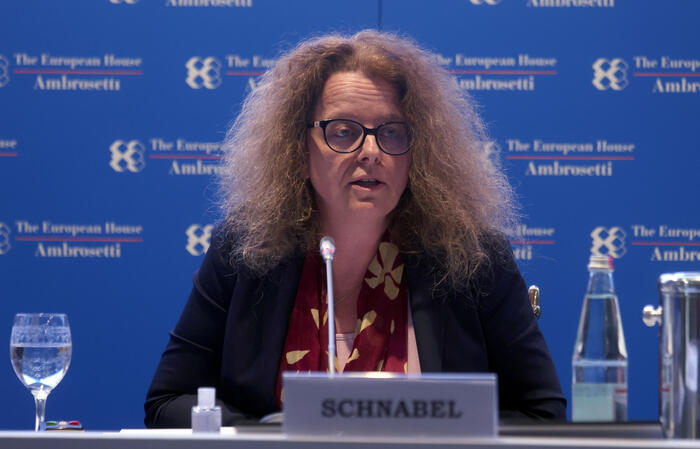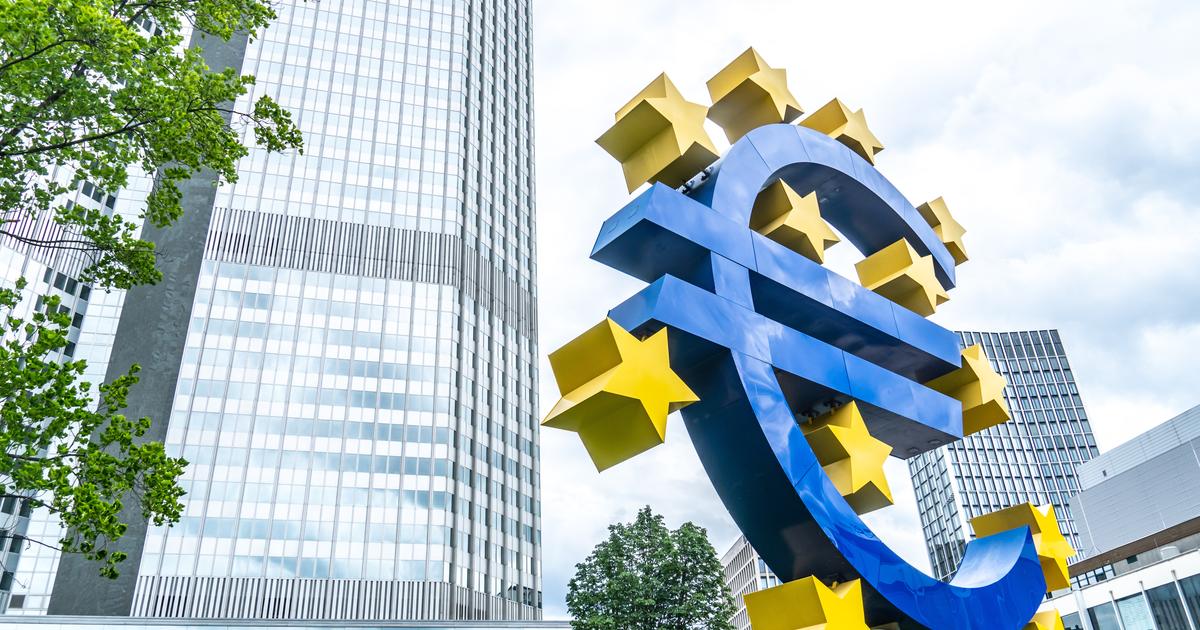Enlarge image
ECB in Frankfurt am Main: It is a problem when central banks have to have a say in such important things
Photo:
ARMANDO BABANI / AFP
It's been in the air for a while - now it's out: Europe's central bankers want to help save the climate in the future.
This is what Christine Lagarde, head of the powerful European Central Bank, announced after an internal strategy debate.
The Governing Council had decided on a comprehensive plan of action to "consider ecological sustainability considerations more systematically in its monetary policy," it said on Thursday.
And the nagging in Germany is immediately great, especially since the central bankers have been intervening unusually vigorously for years and buying government bonds, for example.
Really?
What seems obvious at first glance, on closer inspection, could turn out to be a glorified fair-weather image of what central banks are supposed to do - from a time when the world seemed even simpler.
If monetary authorities around the globe intervene massively again and again today, it has less to do with a sudden mood, but more to do with the fact that there are many more crises and deeper economic difficulties today.
It probably needs a much more fundamental redefinition of what central banks do than the ECB has now formulated - and a lot more protection against the causes of the actual grievances.
Multi-billion amounts in a few hours
Of course, it seems crazy when central banks buy up double-digit billions of euros in bonds from states and companies every month - or, as with the outbreak of the corona pandemic in an emergency, buy up billions within hours because panic sales are increasingly being made on the financial markets.
That has little to do with the quaint idea that the holy monetary authorities, in independence, occasionally raise or lower key interest rates by a quarter of a percentage point.
Just as crazy is just to suggest that the esteemed central bankers would have nothing to do with me, nothing to you - perhaps because they wanted to do some finance ministers a favor with it.
Why then?
According to traditional understanding, the central bankers should simply ensure price stability through the ups and downs of interest rates - higher interest rates in good times so that the economy and prices do not overshoot (and vice versa).
Because everyone has something of stable purchasing power, it was said.
And because all other economic goals - whether full employment, proper state budgets or well-functioning financial markets - either run on their own or have to be guaranteed by the government.
According to the motto: What do the central bankers have to do with all of this?
So it makes sense to leave the guardians of money alone with this supposedly neutral-technocratic task - and to make them as independent as possible, as has been the dictum for decades.
more on the subject
Devaluation: The scourge of inflation is back by Christian Reiermann
However, the dream model has less and less to do with reality - the great deregulation and globalization of the financial markets began in the 1980s.
No coincidence: The monetary authorities had to intervene massively for the first time in 1987, when, after the first surge of financial deregulation in the USA and Great Britain, the stock markets first escalated with joy - and then crashed in the autumn.
This was followed by financial booms and subsequent crashes in Japan, Southeast Asia and other emerging countries in the 1990s, and later the euphoria and crash surrounding the high-tech revolution and the (alleged) new economy.
Not to forget: the big (real estate) crash in 2008. Then the euro crisis.
Similar pattern.
And currently, when the central banks rushed to help after the outbreak of the pandemic.
Rescue succeeded, the financial party continues
Every time the central banks had to run and save - and be it as with Mario Draghi 2012 simply about: We save, no matter what it costs.
The message was enough to stifle speculation about the euro.
Crisis gone.
Sure, every rescue operation in itself contributed to the financial party being able to continue - only the rescue operation of the fire brigade was no less urgent. The local volunteer fire brigade also moves out, no matter who started the fire.
The stronger the influence of the financial markets, including the diverging wealth, the more shaky the assumption has become that what the central banks do beyond acute crises is per se completely neutral and good for everyone. Of course, it doesn't matter what the interest rate is. Those who have a lot of wealth benefit most from high rates, and the debtors suffer. Conversely, every bailout, as was the case most recently in the corona crisis, means that, for example, the banks, which have more money again as a result, also invest more money in shares again - which drives prices and has contributed to the top ten percent, the majority Hold stocks, have benefited more than average from the crisis. Conversely, it is not unimportant to discuss what would have happened in the real economy without intervention: if all experience indicates thatthat thanks to low interest rates, for example, a financial crash that would ultimately have been at the expense of the less well-off was prevented.
Such a financial crash often ends with high unemployment and falling incomes.
The same applies to monetary policy outside of acute crises.
If central banks want to curb inflation with higher interest rates, this also works by simply investing less at higher interest rates - and in case of doubt there are more unemployed.
more on the subject
Strategy revised: ECB increases inflation target to two percent
Monetary policy cannot be reduced to simply monitoring stable price levels
The same basically applies to the climate crisis. Here, too, the assumption that the central bankers act clinically neutral, so to speak, is rather daring. If they buy supposedly equally neutral bonds from companies that are badly damaging to the climate, they are actually also contributing to the fact that it takes longer for these companies to invest in climate-neutral production. This cements existing structures at a time when there is social consensus that economic structures must change as quickly as possible to save the climate. What would that be democratic?
In any case, there is something absurd when central banks spend so much money every month to buy bonds in 2021 without contributing more actively to the solution of what is possibly the most dramatic problem of our time with the large amount of nice money. Especially since it cannot be ruled out that in the next climate shocks all those financial stocks that are still heavily dependent on fossil fuels will crash - which in turn could lead to the next crash. That too would not be in the interests of our monetary authorities.
All of this together fundamentally calls into question how the forefathers of the clinically neutral and independent central bank world had imagined it. Monetary policy is (today) neither neutral nor socially reducible to the pure monitoring of stable price levels. No matter how much the central bankers and their masterminds wish it. What they do is de facto always politically and democratically relevant.
Of course, it is a problem when central banks somehow have to have a say in decisions about such important things as financial stability, wealth distribution and unemployment - without being elected and having to give adequate democratic accountability.
Only that is how reality is.
And it doesn't help to scold the rescuers for it - you don't scold the fire brigade for coming to extinguish the forest fire and getting everything wet while extinguishing it.
more on the subject
Corona crisis: ECB boss Lagarde wants to buy euro government bonds for a long time
Anyone who does not want the ECB to intervene so massively, buy government bonds and keep interest rates a little lower than already, should urgently work to bring financial globalization back under control so that half the world does not regularly drift away from fickleness Speculation depends, banks are instead concentrating more on their main task of financing real investments, and there is less material for speculation at all - in other words: the next crazy boom and the next big crash won't happen every few years.
Until then, it will be bitter if central banks have to intervene again and again.
It's just that it doesn't help if, in the event of non-intervention, there is a threat of much more serious real crises with unemployment and deflation.
You have to fight the causes of the fire - not the fire brigade.
Utopia?
Looks like that.
It's just worth trying.
If one day they manage to shrink the financial world back to its essentials, central bankers no longer need to end crises in an emergency.
Or to prevent deflation with permanent purchases.
Or to keep interest rates a little lower.
Or to live with the fact that one's own politics make the stock-rich even more stock-rich.
It might not even take a fuss about whether or not central bankers should help the climate.
The question of green or brown bonds would arise all the less, the fewer bonds the monetary authorities would have to buy to stabilize the world.
That would be almost the same as before - before the big financial breakdown.




/cloudfront-eu-central-1.images.arcpublishing.com/prisa/C3LDLHDAXBBCFCHWBPELHN64FU.jpg)








